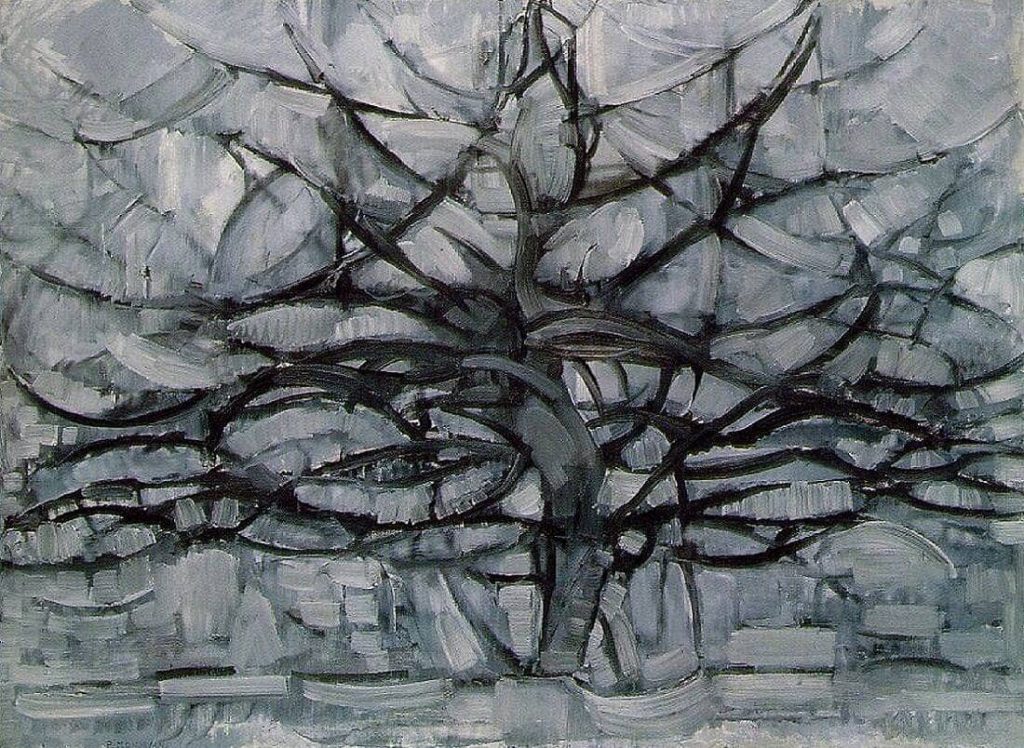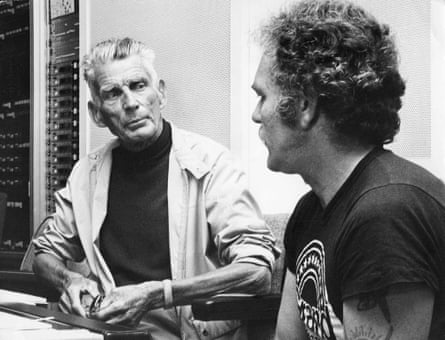by Kenneth Francis (November 2024)

Intellectually, and physically, one of the coolest and most enigmatic figures in 20th century literature was the Irish writer/playwright, Samuel Beckett. A tall, Gothic-looking, lean man with piercing blue eyes (sometimes wearing shades) and steel grey hair, whose chiselled, angular, countenance with furrowed lines, weathered features, and beak-like nose, had a presence that reflected the dark themes in his many works, despite his amiable personality. He is recognised as one of the most important and influential writers of the twentieth century, particularly in the West.
Despite such high regard conferred on Beckett, very few people understand the full meaning of his plays, which are about Existential meaningless existence, particularly his most famous work, Waiting For Godot.
This famous play, and his other theatre works, are of the genre Theatre of the Absurd. To the drama critics of yesteryear, the Theatre of the Absurd was always seen as very French, with Waiting For Godot being premiered at Theatre de Babylone, Paris, in 1953. In Dublin, Ireland, The Gate Theatre is renowned for producing the best performances of Beckett’s plays, especially ‘Godot.’
When ‘Godot’ made its way to Dublin some years after its Paris premier, audiences were divided, but the play soon became popular. This success later resulted in The Gate staging 19 Beckett plays —the first theatre in the world to do so. Waiting For Godot revolves around two homeless men on a barren landscape waiting for someone named Godot. In centre stage stands a tree with no leaves. The men encounter three other male characters who briefly stop to talk but then continue their journey. As for Godot? He never arrives.
In recent years, it has become hip to like Beckett’s work. However, there seems to be a certain kind of dilettante pretentiousness amongst many of Beckett’s fans, due to his plays’ dark Existential content alongside the hidden grammar in many Christian themes.
I mention Christian themes because I believe the Godless Beckett unwittingly gets caught in his own secular net by abandoning theatrical conventions and the existence of God. Such a weird world depicted by Beckett proves that our lives point to the existence of a Creator God, by showing us the absurdity of life on atheism without Him.
Those of us who are sane, no doubt, certainly encounter many lunatics and crackpot ideologies in our modern world. But sane people recognise this, and they also do not behave like the automatons in Beckett’s plays. No normal person lives his or her life as if atheism were true. In Beckett’s plays, there is little love—no quest for beauty, truth, freedom, meaning of life, and purpose.
Such spiritually and earthly desires are also not always attainable for the inmates in prisons, particularly freedom. One such prisoner spoke about this and his understanding of Beckett’s plays amongst fellow inmates who also “got” the meaning of Waiting For Godot. And why wouldn’t they in an institution where inmates are accustomed to long periods of boredom, anxiety, tension, and waiting?
In 2016, a New York Times obituary by Bruce Weber said that the ex-convict, Rick Cluchey (1933-2015), had never been in a theatre— “not even to rob one,” as he was fond of saying—before he was convicted of armed robbery when he was 21 and sentenced to life in prison.
But his life began to change for the better when the San Francisco Actors Workshop performed Waiting For Godot, at San Quentin State Prison in November 1957. Thus began the unlikely redemptive arc of Mr Cluchey’s adulthood, one that led him out of jail and toward a career as an actor and playwright, most notably as a protégé of Samuel Beckett and as an interpreter of his cryptic work, according to Weber.
The NYT obit continues: In later years, Beckett directed Cluchey in a production of Krapp’s Last Tape, his 1958 one-actor play that consists of the title character, a 69-year-old man, reviewing the events of his life as he listens to recordings he made 30 years earlier.

This became Cluchey’s signature role, an excellent performance which can be viewed on YouTube. It was one he performed over the years in New York and several European cities.
When ‘Godot’ opened on Broadway, many critics were indifferent or mystified by its existential tragicomic elements. But the San Quentin inmates seemed to have understood the message of the play due to their own caged incarceration.
A physically tough, volatile, and unpredictable man, Cluchey was deemed an escape risk by prison officials and was not allowed to attend the show. But, according to the New York Times obit, as he later recounted, he listened from his cell over a public address system and immediately recognized himself in the lead characters, the hobos Vladimir and Estragon and perhaps especially in the character of Lucky, a seeming slave who enters tethered to Pozzo, his master.
Cluchey said that the play “was so much about my life, I felt, especially when Lucky and Pozzo come in, and Lucky, of course, has the rope around his neck. Well, that imagery alone, in a performance at a prison would indicate, well, who’s holding rope? The warden? And that was exactly the way Pozzo comes across, as this controlling man who has a slave at the end of the rope. And by extension, I suppose, the two tramps were all humanity, but in the case of a performance at a prison, one would say they were in prison, too.”
Shortly afterward, the San Quentin Drama Workshop, a prisoners’ troupe was formed. Cluchey, as a leading member, wrote a play, The Cage, which was a commutation of his sentence (he was released on parole in 1966). This play was also performed in many cities.
For me, I enjoy Beckett’s avant-garde drama, despite the nonsensical dialogue void of plot or meaning. There is a poetic feel to the narrative that is earthy, lyrical, and intriguing. His plays display what a Godless world would look like, although some inverted aspects of contemporary life would give his drama a run for its money: There is no character in Beckett’s plays who identifies as a cat, and no women marrying bridges or trees.
It is uncertain what Cluchey’s religious beliefs were, but he certainly connected with Beckett’s plays which, fortunately, resulted in his quest for freedom—meaning, theatrical creativity, and a long life.
In January 2019, writing in American Theatre, Russell M. Dembin said that Martin Esslin opened his 1961 tome The Theatre of the Absurd, which defined and named the genre, with a description of the San Quentin performance, marvelling that “what had bewildered the sophisticated audiences of Paris, London, and New York was immediately grasped by an audience of convicts.”
Table of Contents
Kenneth Francis is a Contributing Editor at New English Review. For the past 30 years, he has worked as an editor in various publications, as well as a university lecturer in journalism. He also holds an MA in Theology and is the author of The Little Book of God, Mind, Cosmos and Truth (St Pauls Publishing) and, most recently, The Terror of Existence: From Ecclesiastes to Theatre of the Absurd (with Theodore Dalrymple) and Neither Trumpets Nor Violins (with Theodore Dalrymple and Samuel Hux).
Follow NER on Twitter @NERIconoclast
- Like
- Digg
- Del
- Tumblr
- VKontakte
- Buffer
- Love This
- Odnoklassniki
- Meneame
- Blogger
- Amazon
- Yahoo Mail
- Gmail
- AOL
- Newsvine
- HackerNews
- Evernote
- MySpace
- Mail.ru
- Viadeo
- Line
- Comments
- Yummly
- SMS
- Viber
- Telegram
- Subscribe
- Skype
- Facebook Messenger
- Kakao
- LiveJournal
- Yammer
- Edgar
- Fintel
- Mix
- Instapaper
- Copy Link







One Response
Very interesting.